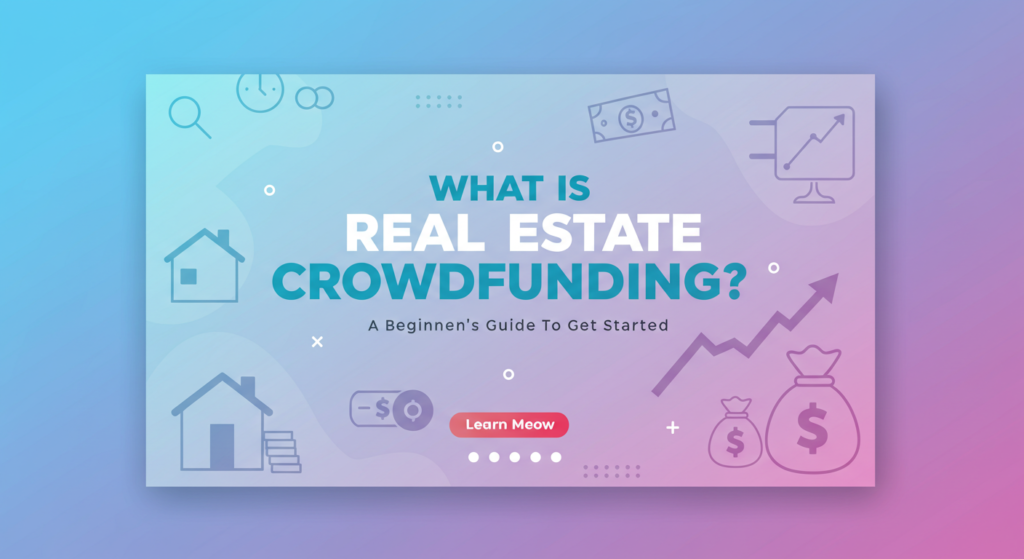What Is Real Estate Crowdfunding? A Beginner’s Guide to Get Started

Real estate crowdfunding has revolutionized how individuals invest in real estate. By pooling funds with other investors, you can participate in lucrative real estate projects without the need for substantial capital or direct property ownership. This beginner’s guide will help you understand the basics of real estate crowdfunding, its benefits, and how to get started.
What Is Real Estate Crowdfunding?
Real estate crowdfunding is a method of raising capital for real estate projects through contributions from multiple investors. Platforms act as intermediaries, allowing individuals to invest in residential, commercial, or industrial properties with relatively small amounts of money.
How Does Real Estate Crowdfunding Work?
- Developers Seek Funding: Real estate developers or sponsors list their projects on crowdfunding platforms to raise capital.
- Investors Contribute: Individual investors contribute funds to these projects in exchange for a share of ownership or debt.
- Returns Are Earned: Investors receive returns through rental income, interest payments, or property appreciation.
Types of Real Estate Crowdfunding Investments
- Equity Investments:
- Investors own a portion of the property.
- Returns come from rental income and property appreciation.
- Higher potential returns but increased risk.
- Debt Investments:
- Investors lend money to developers.
- Returns come from fixed interest payments.
- Lower risk compared to equity investments.
Benefits of Real Estate Crowdfunding
1. Accessibility: Crowdfunding platforms lower the barrier to entry, allowing investments as small as $500.
2. Diversification: Invest in multiple properties across various locations and asset types to reduce risk.
3. Passive Income: Receive regular income through dividends or interest payments without managing properties.
4. Transparency: Platforms provide detailed project information, including expected returns, risks, and timelines.
5. Professional Management: Projects are managed by experienced developers, reducing the need for hands-on involvement.
Risks of Real Estate Crowdfunding
1. Illiquidity: Most real estate crowdfunding investments are long-term and cannot be easily sold or withdrawn.
2. Platform Reliability: Not all platforms are reputable. Research thoroughly before committing funds.
3. Market Risks: Real estate markets are subject to fluctuations that may affect returns.
4. Loss of Capital: As with any investment, there’s a risk of losing your principal if the project fails.
How to Get Started with Real Estate Crowdfunding
1. Research Platforms: Choose reputable platforms such as:
- Fundrise
- CrowdStreet
- RealtyMogul
2. Assess Your Financial Goals: Determine whether you’re seeking passive income, long-term appreciation, or both.
3. Understand Fees: Crowdfunding platforms often charge management and administrative fees. Ensure these are reasonable.
4. Diversify Your Investments: Spread your investments across multiple projects and platforms to minimize risk.
5. Start Small: Begin with small contributions to gain experience and confidence.
Top Real Estate Crowdfunding Platforms in 2025
- Fundrise:
- Best for beginners.
- Low minimum investment ($10).
- Focus on residential and commercial properties.
- CrowdStreet:
- Best for accredited investors.
- Access to high-quality commercial projects.
- Comprehensive marketplace.
- RealtyMogul:
- Offers both equity and debt investments.
- Open to both accredited and non-accredited investors.
- Yieldstreet:
- Focuses on alternative investments, including real estate.
- Provides fixed-income opportunities.
Key Considerations Before Investing
- Minimum Investment: Ensure the required amount fits within your budget.
- Investment Horizon: Real estate crowdfunding is typically long-term, with durations ranging from 3 to 10 years.
- Tax Implications: Understand how your returns will be taxed based on the investment type.
- Due Diligence: Review project details, developer experience, and expected returns before investing.
Final Thoughts
Real estate crowdfunding is an innovative way to invest in real estate without the challenges of direct ownership. With minimal capital requirements, professional management, and diverse opportunities, it’s an excellent option for beginners looking to enter the real estate market. By understanding the risks and doing thorough research, you can make informed decisions and build a profitable portfolio.
FAQs
1. Is real estate crowdfunding safe? While it offers great potential, it’s not without risks. Choose reputable platforms and diversify your investments to reduce risk.
2. Do I need to be an accredited investor? Some platforms require accreditation, but others, like Fundrise, are open to all investors.
3. How much money do I need to start? You can start with as little as $10 on platforms like Fundrise, though most platforms have minimums ranging from $500 to $1,000.
4. How are returns paid? Returns are typically distributed as dividends, interest payments, or property sale profits, depending on the investment type.
Leave a Reply